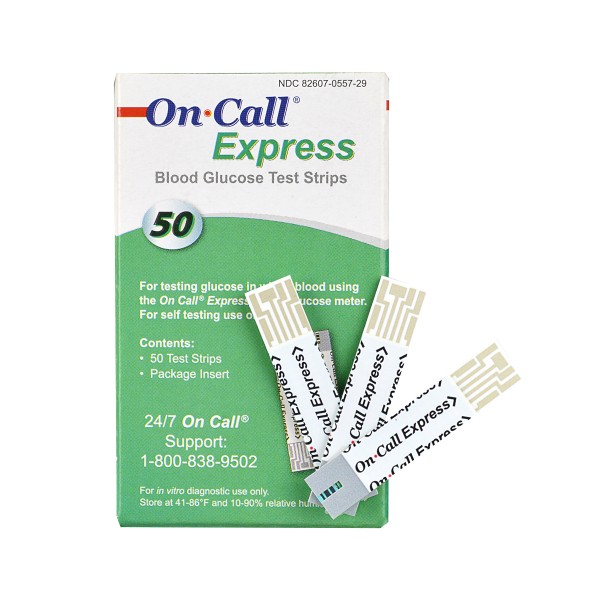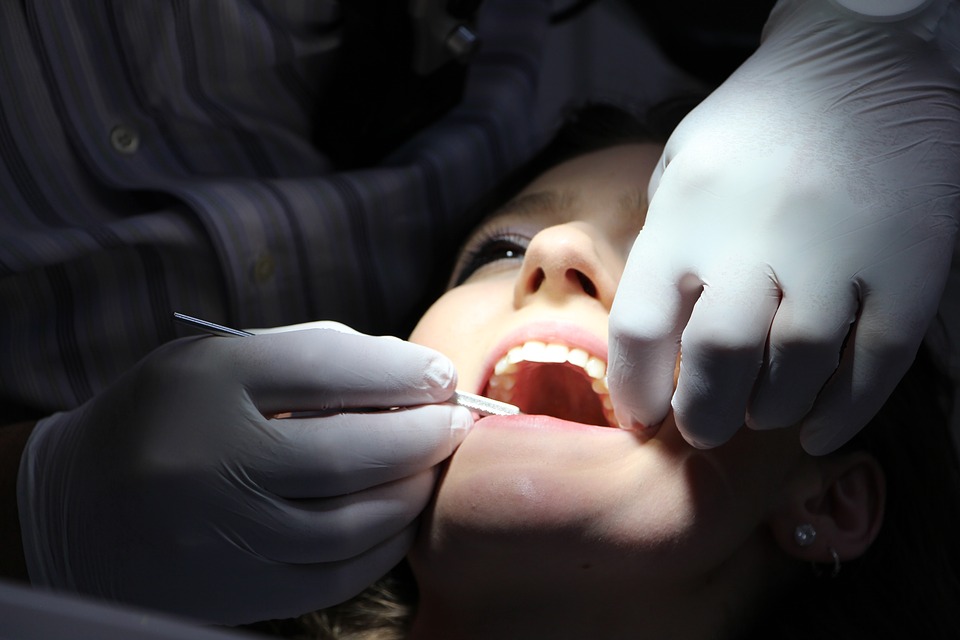
It is important to take good care of your teeth when you have diabetes. Did you know that people with diabetes are more likely to have problems with their teeth and gums? The good news is that you can take steps to help keep your teeth healthy.
By reading through the information and tips in this blog, you will be well on your way to understanding more about Diabetes and Oral Health Problems and why Healthy Teeth Matter!
Oral Diseases
Oral diseases such as dental decay (cavities), gingivitis (bleeding gums), and periodontal disease (gum disease) are all contagious diseases. Each of them are caused by a certain germ just like the 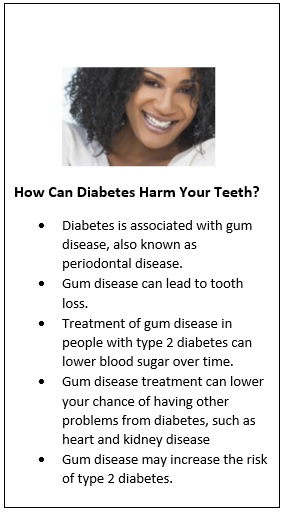 common cold and flu and can be passed from person to person. The germs that cause dental diseases can be spread from person to person via affectionate contact such as kissing, or sharing of toothbrushes, food, eating utensils or drinks.
common cold and flu and can be passed from person to person. The germs that cause dental diseases can be spread from person to person via affectionate contact such as kissing, or sharing of toothbrushes, food, eating utensils or drinks.
Plaque is the main cause of gum disease, but diabetes can also be a culprit because it may weaken your mouth’s germ-fighting powers. High blood glucose levels can make gum disease worse, and at the same time, gum disease can make diabetes harder to control.
Often gum disease is painless. You may not even know you have it until it causes serious damage. Regular dentist visits are the best option for prevention.
While gum disease may not hurt, there are warning signs to watch for.
- Bleeding gums when you brush or floss. This bleeding is not normal. Even if your gums don’t hurt, get them checked.
- Red, swollen or tender gums
- Gums that have pulled away from teeth. Part of the tooth’s root may show, or your teeth may look longer.
- Pus between the teeth and gums (when you press on the gums)
- Bad breath
- Permanent teeth that are loose or moving away from each other
- Changes in the way your teeth fit when you bite
- Changes in the fit of partial dentures or bridges
What Is Periodontal Disease?
Periodontal disease, or gum disease, is a bacterial infection of the gums, ligaments, and bone that support your teeth and hold them in the jaw. If left untreated, you may experience tooth loss. The main cause of periodontal disease is bacterial plaque, a sticky, colorless microbial film that constantly forms on your teeth. Toxins (or poisons) produced by the bacteria in plaque irritate the gums, causing infection.
Does gum disease impact diabetes and vice versa?
Emerging research also suggests that the relationship between serious gum disease and diabetes is two-way. Not only are people with diabetes more susceptible to serious gum disease, but serious gum disease may have the potential to affect blood glucose control.
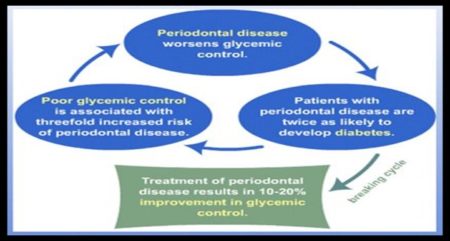
Research suggests that people with diabetes are at higher risk for gum disease, ranging from gingivitis (an early stage of gum disease) to periodontitis (serious gum disease). According to the Centers for Disease Control and Prevention, people living with diabetes are two times as likely to develop gum disease 1. That’s because people with diabetes are generally more susceptible to infections and less able to fight germs that invade the gums.
Dental Decay
Diabetes puts folks at higher risk of dental decay, also known as cavities. There are 4 components that must be present for cavities to occur- a tooth, bacteria in plaque, food, and time. Each time that you ingest anything in your mouth, the bacteria in plaque on your teeth produces an acid for 20 minutes that begins to break down tooth surface which allows the process for tooth decay to start. So, it’s not just what you eat but how often you eat that increases your risk of cavities. And remember, frequency of sugar ingestion is just as important as amount of sugar eaten.

Prevention
The Surgeon General’s Report on Oral Health states that good oral health is integral to general health for all Americans. So be sure to take a look at the tips below on how to better fight against the germs that invade the gums.
Tips to Keep Your Teeth Healthy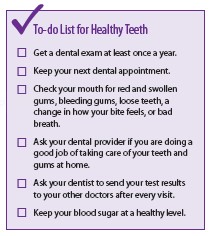
- Get a dental exam at least once a year, and more often if your dentist says you need one. At your exam, your dentist or dental hygienist will:
- Explain how diabetes affects your teeth and gums.
- Check for problems, such as cavities or gum disease (see next page to learn the signs of gum disease).
- Treat any problems you have with your teeth or gums.
- Teach you how to check for signs of gum disease at home.
- Provide care, such as a fluoride treatment, to keep your mouth healthy.
- Tell you how to treat problems, such as dry mouth.
- Work with your dentist to create a health plan for your teeth.
- Ask the best way to take care of your teeth at home.
- Ask how often to come in for a dental visit.
- Ask what to do if you start to have problems with your teeth or gums.
- Ask your dentist to send your exam results to your other doctors after every visit.
- Take care of your teeth at home.
- Brush with a soft-bristled toothbrush at least two times a day, using toothpaste with fluoride.
- Floss once a day.
- Visit a dentist if you think you have gum disease.
- Limit food and drinks that are high in sugar.
References and Acknowledgements:
1 CDC, National Diabetes Statistics Report, 2014: http://www.cdc.gov/diabetes/pubs/statsreport14/national-diabetes-report-web.pdf
2 Colgate: Diabetes and Oral Health, accessed 1/11/2017 @ http://www.colgateprofessional.co.in/patienteducation/Diabetes-and-Oral-Health/article
National Diabetes Education Program, www.cdc.gov/diabetes/ndep
Dental Decay Image: Recipe for tooth decay formation [digital image]. Retrieved from http://www.prestige-dental-care.com.my/blog/general-dental-treatment/dental-caries.html
Gum Disease & Diabetes Slide: Maier, Russell, MD. 2014, September. Open Wide: Common Infectious Conditions We Overlook, What’s New In Medicine [Washington Dental Service Foundation]. Retrieved from http://slideplayer.com/slide/3856268/

